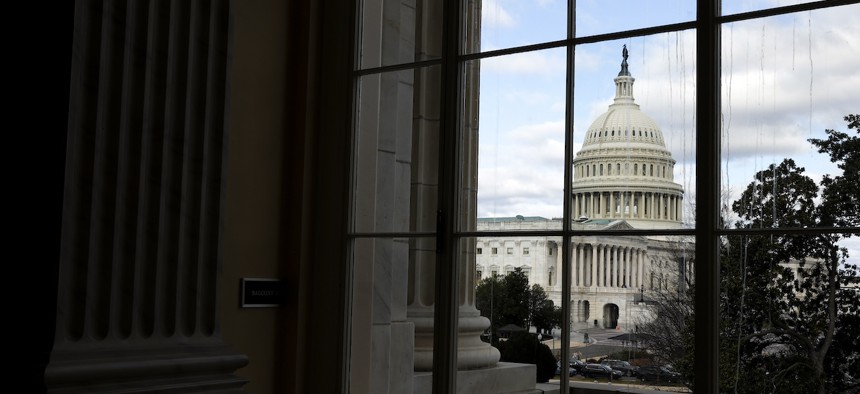
The U.S. Capitol Building is seen from a window in the Cannon Office Building on Jan. 29, 2024. Lawmakers are making progress on funding bills for fiscal 2024. Anna Moneymaker/Getty Images
Lawmakers reach a bipartisan breakthrough for FY24 funding
Congress is now one step closer to finally passing full year appropriations, but some hurdles remain.
Key congressional negotiators have reached an agreement on how to divvy up funding for the fiscal 2024 spending bills, clearing a major threshold that will allow appropriators to finalize those measures.
The deal, confirmed by a source familiar with talks, was hammered out after weeks of negotiations between Sen. Patty Murray, D-Wash., and Rep. Kay Granger, R-Texas, who respectively chair the Senate and House Appropriations Committees, and establishes how much money will be allocated to each of the 12 bills Congress must pass to fund government each year. With those allocations set, lawmakers can now complete their work of setting line-by-line funding for every program and office in agencies across government.
The breakthrough follows a deal between Senate Majority Leader Chuck Schumer, D-N.Y., and House Speaker Mike Johnson, R-La., on the overall spending levels for the fiscal year. The forthcoming bills will draw from the $1.66 trillion they agreed to as the top-line spending level. Murray and Granger have not disclosed the funding for each of the 12 spending bills, but on an overall basis defense spending will jump 3% to $886 billion and non-defense spending will stay essentially flat relative to fiscal 2023 at nearly $773 billion.
Congress earlier this month averted a shutdown by punting the funding deadlines for some agencies to March 1 and other to March 8, which leaders in both chambers said would buy time to set funding allocations and draft bills. While step one of the process is complete, there is still much work ahead for appropriators. They must now determine how much money each agency and office will receive and decide what, if any, policy changes to include. While Democrats have vowed to reject any policy riders they consider “poison pills,” Johnson has said he would push for “meaningful policy wins” as part of the spending bills.
Those efforts could disrupt the goal of writing and passing funding bills before March. Adding to the complications is the ongoing negotiation over supplemental funding for foreign aid and border security reforms. With House Republicans balking at those talks, they could instead seek to add to the Homeland Security Department coffers through the regular funding process at the expense of other agencies. Lawmakers have also stressed they do not want to pass all 12 measures together in one omnibus bill, as Congress has done in most recent years.
A failure to pass full-year appropriations that would require another stopgap bill in March would be accompanied by major risks. Under a provision of the 2023 debt ceiling law, a CR that goes into May would force devastating, across-the-board cuts that would likely require employee furloughs and significant disruptions to agency operations.
Even if Congress can pass appropriations bills by the March deadlines, the fiscal year will be nearly halfway over and agencies will be under pressure to get the money out the door in an expedited timeline. The problem is one with which agencies have familiarity, however, and that they last confronted in fiscal 2022 when Congress also approved appropriations in mid-March.







